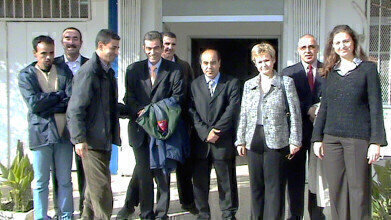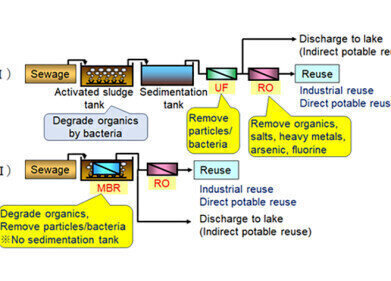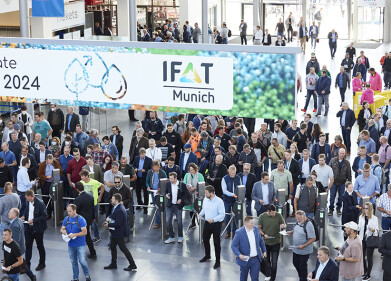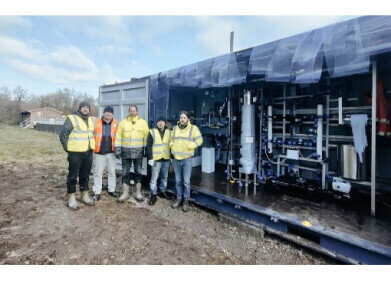Water/Wastewater
Wastewater treatment plant for multiple water use
Apr 29 2009
WABAG (Austria) is completing Algeria’s first municipal wastewater treatment plant to offer multiple water use. This successful pilot project is seen as a prototype for further wastewater treatment plant projects in the country. Indeed, with nine wastewater and seven drinking water treatment plants, which provide some eight million inhabitants with a secure water supply and disposal system, WABAG occupies a leading position in the Algerian market.
Algeria’s pilot project in the reuse sector The Reghaia wastewater plant, which recently went online, displays a special feature in the form of an additional treatment phase, which allows the use of the cleaned wastewater as service water for e.g. agricultural irrigation. Reghaia is thus the first plant in Algeria to facilitate the recycling of treated, municipal wastewater and the intention is that the technical process concept employed by WABAG for this successful pilot project be employed for additional wastewater treatment plants in Algeria. Innovative WABAG wastewater filtration guarantees reuse In 2005, WABAG received a commission worth over EUR 11 million for the planning, completion and two-year operational management of the Reghaia wastewater plant, which is located near Algiers. The existing mechanical pre-treatment phase was supplemented by a biological stage using the proven activated sludge process. In addition, filtration was added as a downstream tertiary treatment phase, prior to final wastewater disinfection. The Reghaia plant has a capacity of 260,000 p.e. and can thus produce 80,000 m3/d of service water from municipal wastewater. WABAG’s proven multi-layer filtration process is utilised for wastewater filtration. This process has been in use for the past thirty years and has been continually further developed. It is employed in a diversity of plants worldwide for both drinking water and wastewater treatment, where it is used for discharge into sensitive waters or water reclamation. The WABAG filtration system offers a number of advantages as compared to conventional filtration plants. These include outlet regulated deep bed filtration at a constantly high water level with high filtration performance, efficient backwashing without filter media loss and law backwash water consumption, tailor-made solutions using various filter floor systems, the employment of differing filter media combinations and a compact design. WABAG is an expert in the field of water reclamation Water is a raw material that for an increasing number of people is in ever-shorter supply. 70 per cent of water consumption relates to agriculture, 22 per cent to industry and 8 per cent to private households. The production of a single tomato requires 13l of water, 1 kg of meat 15,500l. The multiple use of water is possible using modern technologies and is of growing importance in all regions. WABAG confronted this challenge at a very early stage and has realised a series of innovative water reclamation plants for both municipal and industrial purposes. Industrial and municipal wastewater can be entirely recycled using the appropriate technology and then utilised as service and industrial water (e.g. as boiler feed water or cooling make-up water for power plants) and even as drinking water. For example, since 2001 a WABAG plant in Windhoek, Namibia has been producing up to 21,000 m3/d of clean drinking water from a mixture of treated wastewater and contaminated reservoir water. Reghaia is special, but not WABAG’s first wastewater plant in Algeria Algeria has, and will continue, to make sizeable investments in its water industry. Over the past years WABAG has completed seven drinking water and nine biological wastewater treatment plants. These supply five million people with clean drinking water and over three million with environment-compatible wastewater treatment. Like Reghaia, eight of these plants have been built according to the DBO principle (Design-Build-Operate). This means that following successful start-up, WABAG assumes the operational management of the plant for a defined period of time. In 2003, WABAG founded a subsidiary in Algeria and Dietmar Vergud, the CEO of the VA TECH WABAG srl in Algier is well satisfied with the company’s progress, “Above all, our customers respect our powerful presence in the local market with a current workforce of 200 and the professional realisation of the projects undergoing completion in the various regions of the country.” At the end of November, the JIJEL (150,000 p.e.) wastewater treatment plant was officially opened by the Algerian Minister of Water Resources and this also saw the start of the operational management phase. Algeria’s largest wastewater treatment plant in ORAN (1.5 million p.e.) is finished and last week the start-up of the water line commenced with the filling of the clarifiers and tanks with wastewater from the municipal sewer network. The BARAKI wastewater treatment plant in the capital Algiers, which with a capacity of 750,000 p.e. is the second largest in Algeria, has been comprehensively overhauled and enlarged by WABAG. Start-up commenced in summer 2008 and will probably be concluded at the beginning of 2009. Josef Schnaitl, the VA TECH WABAG GmbH, Vienna, COO sums up, “Due to its design and the target of water reuse, the Reghaia project occupies a special place in the series of WABAG plants in Algeria. We are confident that the availability of innovative, in-house developed technologies, in tandem with WABAG’s comprehensive project experience in the country, will ensure that our company will continue to be seen as a reliable and preferred partner. We would be especially pleased if in future we could use of our competences in the water reclamation and recycling sector to an even greater extent in teamwork with the responsible authorities.”Events
Apr 22 2024 Hannover, Germany
Apr 23 2024 Kuala Lumpur, Malaysia
Apr 24 2024 Sao Paulo, Brasil
May 05 2024 Seville, Spain
May 13 2024 Munich, Germany













